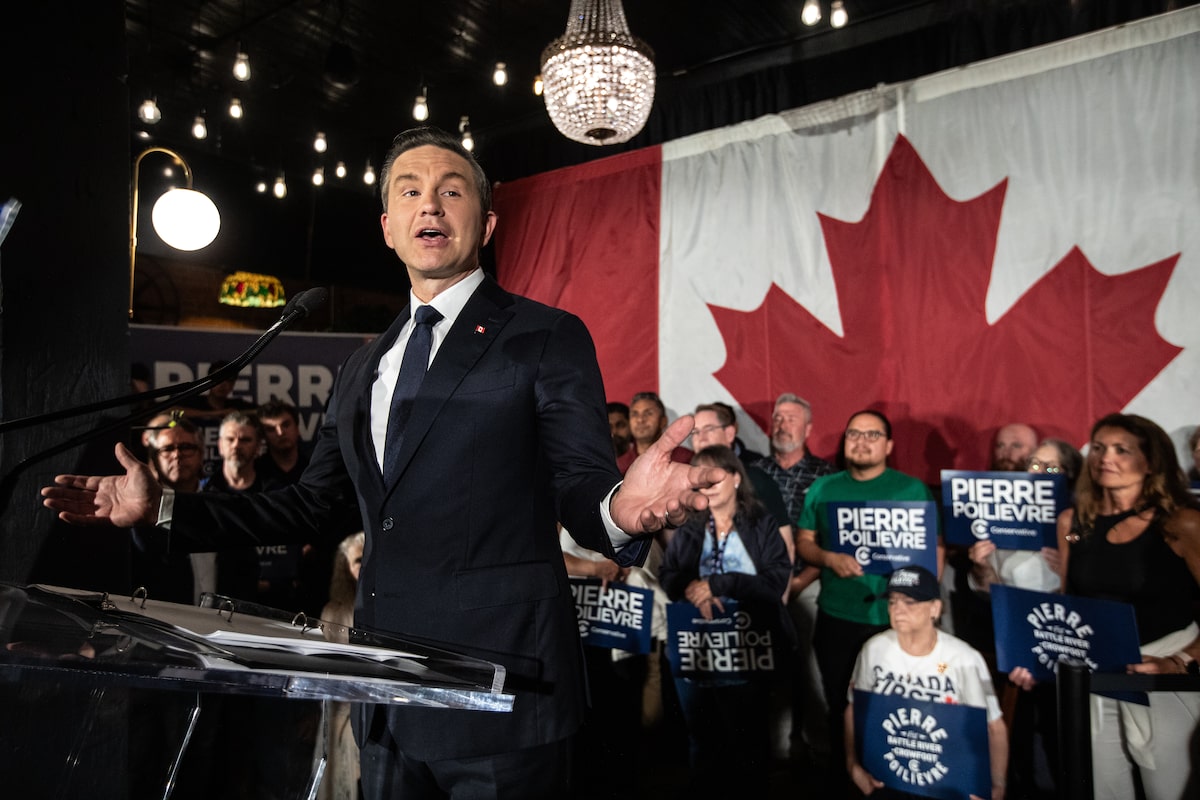Conservative Leader Pierre Poilievre celebrates winning the Battle River-Crowfoot by-election in Camrose, Alta., on Monday.JASON FRANSON/The Canadian Press
Pierre Poilievre is touting his by-election win in Alberta this week as a sign of political resilience, saying he will go on to hold the government accountable on such issues as crime, the economy and its commitment to electric-vehicle mandates.
The federal Conservative Leader won the riding of Battle River-Crowfoot with 80.4 per cent of the vote on Monday, setting the stage for his return to the House of Commons after being defeated in his long-time Ottawa-area riding in the April federal election.
However, it remains unclear whether he will be sworn in as an MP by the time members return to the Commons on Sept. 15 after the summer break.
“To anyone who has been knocked down, but has got back up and kept on going, you haven’t given up, so I won’t give up,” Mr. Poilievre told supporters in the riding on Monday.
He ran in Battle River-Crowfoot after Damien Kurek, who won the riding in April, stepped down to allow his party leader a chance to seek a seat.
Going forward, Mr. Poilievre faces a vote on his leadership at a party convention in Calgary in January after the Conservatives, with him at the helm, failed to win the general election despite routinely leading the Liberals in public-opinion polling ahead of the vote.
Three takeaways after Poilievre wins Alberta by-election
During his victory speech Monday night, Mr. Poilievre did not explicitly mention his setbacks but spoke generally about continuing to fight for his political agenda in the face of challenges.
“The road to success is never a straight line,” Mr. Poilievre said.
“As my mother, who’s here today, taught me, when you get knocked down, you get up and you keep going. If you believe in what you’re doing, you march forward,” he said.
That push appears to be set to continue Wednesday with the Official Opposition Leader holding a news conference in Surrey, B.C., to announce policies on crime.
New public-opinion data from Nanos Research, released Tuesday, suggest the Liberals, under Mark Carney, have 44-per-cent support, compared with 32 per cent for the Conservatives and 12 per cent for the NDP.
The same research suggests Mr. Poilievre trails Mr. Carney by 27 percentage points in preferred prime minister tracking – with the two leaders receiving 24-per-cent and 51-per-cent support, respectively – and with U.S. President Donald Trump and Canada-U.S. relations being respondents’ No. 1 concern.
“The Liberals remain in the drivers’ seat in the post-election period,” Nik Nanos, the company’s chief data scientist, said in a statement.
Conservative Leader Pierre Poilievre secured a seat in the House of Commons late Monday, winning a by-election in Alberta’s Battle River-Crowfoot.
The Canadian Press
Mr. Poilievre said that more than 150 days after Mr. Carney took office, Canada remains plagued by challenges related to crime, immigration, housing costs and inflation.
This fall in Parliament, he said, Conservatives will oppose the Liberals and offer solutions to help create safe streets and secure borders.
“We are going to be ready to work with any party to get these results,” he said, adding that includes issues around tariffs imposed by the United States. “We continue to extend our hand to Mr. Carney and say that we want to work with any party to put an end to tariffs and get a fair deal for Canada.”
Mr. Poilievre has already said his party will push the Liberals to repeal a mandate, aimed at reducing emissions, requiring 20 per cent of vehicles sold in Canada in 2026 to be zero-emission models, rising to 60 per cent by 2030 and 100 per cent by 2035.
Ginny Roth, who served as communications director for Mr. Poilievre’s successful 2022 Conservative leadership bid and is now a partner at the Crestview Strategy public-affairs agency, said he must balance a critique of where the government has fallen short of its commitments with advancing Conservative solutions.
Opinion: Pierre Poilievre can be an attack dog and a grown-up all at the same time
She said the necessity of Mr. Poilievre campaigning for the by-election provided him sustained engagement with voters, which may have given him perspective helpful for dealing with the Liberal government.
Ms. Roth also said the Conservative Leader should not change his combative tone.
“Poilievre’s fighter tone, which is authentic to him, is an incredible asset of his, and it’s what allowed him to build the biggest Conservative coalition since the Harper majority in 2011, and so to abandon that would be foolish,” she said.
“He should continue. Poilievre should be Poilievre.”
The Alberta by-election was targeted by the Longest Ballot Committee, a protest group that advocates for electoral reform by stacking ballots with dozens of independent candidates who are not trying to win.
In Battle River-Crowfoot, the list of registered candidates stretched to 214 names, 201 of them associated with the Longest Ballot Committee. The result, ironically, was the creation of the shortest ballot possible.
Elections Canada announced that, rather than print all the names on each ballot, it would instead require voters to write their preferred candidate’s name. The elections agency said each ballot would be counted as long as the voter’s intention was clear.
On Tuesday, the agency said its strategy was based on lessons learned from previous long-ballot protests.
Matthew McKenna said in a statement that Elections Canada will assess how the vote proceeded and publish the details of that review in coming months.
“As this was the first time Elections Canada has used a write-in ballot for advance and election day polls, we will look closely at how things went yesterday to see what worked well and what could be improved should such a ballot be used again in future elections,” he wrote.

